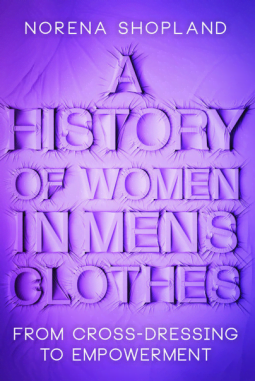
Traditionally, historic women have been seen as bound by social conventions, unable to travel unless accompanied and limited in their ability to do what they want when they want. But thousands of women broke those rules, put on banned clothing and travelled, worked and even lived whole lives as men. As access to novels and newspapers increased in the nineteenth century so did the number of women defying Biblical and social restrictions. They copied each other’s motives and excuses and moved into the world of men. Most were working-class women who either needed to or wanted to, break away from constricted lives; women who wanted to watch a hanging or visit a museum, to see family or escape domestic abuse, some wanted to earn a decent living when women’s wages could not keep a family. The reasons were myriad. Some were quickly arrested and put on display in court, hoping to deter other women from such shameful behaviour, but many more got away with it.
This book is hilarious and horrifying. Did you know that women were banned in France from wearing trousers? If they wanted to wear "male" clothing they had to apply to the police and pay for a permit. The ban was overturned in... 2013!
The whole book is full of maddening little anecdotes about the way society treated (and still treats) women who deviate from societal expectations. At times, all you can do is to laugh to stop yourself crying. The book sometimes feels like a catalogue of Fragile Masculinity - as men of the age rage against women encroaching into "their" territory". The fear that a woman might do as good a job as a man - as an employee or as a lover - is seen as an existential threat which must be crushed.
It is difficult to place modern attitudes on historic figures. Our notions of people's gender and sexuality don't always fit with how they thought of themselves. Are these "gal-pals" or lesbians? Is this person wearing men's clothes out of economic necessity or because they are Trans? We can't ever know their lived experience, but the author uses great care and sensitivity to describe all those involved.
Because the book is drawn from contemporary news reports, it can get a little repetitive. Tiny glimpses of a life told through a paragraph in a provincial newspaper. But it only serves to reinforce the message that women have always worn men's clothes. And almost always been subject to ridicule or punishment for it.
The book mostly draws from English-language reports, so is firmly tied to the Anglosphere - with occasional forays into France, Germany, and China. It is meticulously referenced, and contains some images of news cuttings to peruse.
Much like Miranda Kaufmann "Black Tudors", it is a fascinating book which uncovers a facet of history which is often conveniently ignored.
Thanks to NetGalley for the review copy. The book is released later this year and can be pre-ordered using the links below:
What links here from around this blog?